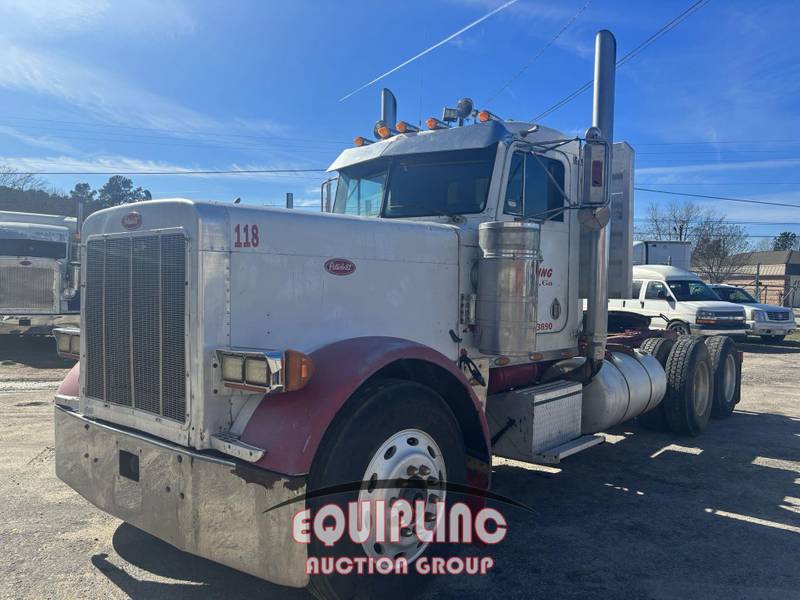Rebuilt Semi Trucks For Sale: Your Comprehensive Guide to Smart Investments pickup.truckstrend.com
In the dynamic world of commercial trucking, acquiring reliable equipment is paramount. For many owner-operators and fleet managers, the prohibitive cost of a brand-new semi truck can be a significant barrier. This is where "rebuilt semi trucks for sale" emerge as a compelling and increasingly popular alternative. Far more than just a "used" truck, a rebuilt semi undergoes a meticulous and extensive restoration process, breathing new life into a robust chassis and components. This comprehensive guide will delve into what makes rebuilt semi trucks a wise investment, exploring their benefits, key considerations, the rebuilding process, and practical advice to help you navigate this valuable market.
Understanding Rebuilt Semi Trucks: More Than Just a Repair
Rebuilt Semi Trucks For Sale: Your Comprehensive Guide to Smart Investments
At its core, a rebuilt semi truck is a vehicle that has undergone a significant overhaul of its major mechanical components, often including the engine, transmission, differentials, and suspension systems. Unlike a standard used truck, which might only receive minor repairs to address existing issues, a rebuilt truck is systematically disassembled, inspected, and then reassembled with new or remanufactured parts to restore it to near-original specifications, or even improve upon them.
The distinction is crucial. While a "used" truck simply means it’s had a previous owner, a "rebuilt" truck implies a deep dive into its most critical systems. This process typically involves:
- Engine: Complete tear-down, inspection, replacement of worn parts (pistons, rings, bearings, camshafts), resurfacing, and reassembly to factory specifications.
- Transmission & Driveline: Overhaul or replacement of gears, clutches, synchronizers, and bearings, ensuring smooth and reliable power delivery.
- Axles & Suspension: Inspection and replacement of components like bearings, seals, kingpins, bushings, and springs to ensure proper alignment and ride quality.
- Brakes: Comprehensive inspection and replacement of brake shoes, drums, rotors, calipers, and air system components.
- Chassis & Frame: Inspection for cracks, rust, or damage, with necessary repairs or reinforcements.
- Electrical System: Thorough check and repair/replacement of wiring, lights, and electronic control units.
- Cab & Interior: Often includes refurbishment of seats, dashboard, sleepers, and general aesthetics to enhance driver comfort and presentation.

The goal is to extend the truck’s operational life significantly, offering a reliable, high-performance asset at a fraction of the cost of a new one.
The Compelling Advantages of Opting for a Rebuilt Semi Truck

Choosing a rebuilt semi truck offers a multitude of benefits that appeal to budget-conscious buyers without compromising on performance or reliability.
- Significant Cost Savings: This is perhaps the most obvious advantage. A fully rebuilt semi truck can cost anywhere from 30% to 60% less than a comparable new model. This substantial saving frees up capital for other business needs or allows for a faster return on investment.
- Extended Lifespan & Reliability: When rebuilt by reputable professionals using quality parts, these trucks can offer many more years and hundreds of thousands of miles of dependable service. The comprehensive nature of the rebuild means that common wear-and-tear components have been addressed, often leading to performance comparable to a new truck.
- Reduced Depreciation: New trucks experience rapid depreciation in their first few years. Rebuilt trucks, having already undergone this initial depreciation, tend to hold their value better over time, making them a smarter long-term asset.
- Environmental Responsibility: Opting for a rebuilt truck is a greener choice. It promotes sustainability by reusing and recycling existing truck components, reducing the demand for new manufacturing and minimizing waste.
- Faster Availability: Unlike new trucks that often have long lead times for manufacturing and delivery, rebuilt trucks are typically available for immediate purchase, allowing businesses to expand their fleet or replace a vehicle quickly.
- Customization Potential: The rebuilding process often presents an opportunity for buyers to request specific upgrades or customizations, such as auxiliary power units (APUs), specialized lighting, or interior enhancements, tailoring the truck to their exact operational needs.

Key Considerations When Buying a Rebuilt Semi Truck
While the benefits are clear, making an informed purchase requires careful consideration of several critical factors.
- The Rebuilder’s Reputation and Expertise: This is paramount. Research the rebuilder’s history, read customer reviews, and inquire about their certifications and the experience of their technicians. A reputable rebuilder will be transparent about their process and stand behind their work.
- Comprehensive Documentation: Insist on detailed records of the rebuild. This should include a list of all parts replaced, work performed, the original truck’s VIN, mileage before the rebuild, and any donor vehicle information. Transparency in documentation is a strong indicator of a trustworthy rebuilder.
- Warranty Details: A robust warranty is a non-negotiable aspect of buying a rebuilt truck. Understand exactly what is covered (engine, transmission, driveline, electrical, etc.), for how long, and any mileage limitations. Clarify who honors the warranty (the rebuilder, a third-party, or a manufacturer).
- Pre-Purchase Inspection (PPI): Even with a warranty, always arrange for an independent, third-party mechanic specializing in heavy trucks to conduct a thorough pre-purchase inspection. This can uncover potential issues not visible to the untrained eye and provide peace of mind.
- Quality of Components Used: Ask if the rebuilder uses genuine OEM (Original Equipment Manufacturer) parts, high-quality aftermarket parts, or remanufactured components. The quality of parts directly impacts the truck’s longevity and reliability.
- Road Test: A comprehensive road test under varying conditions (empty, loaded if possible, highway, city) is crucial to assess the truck’s performance, handling, braking, and any unusual noises or vibrations.
- Financing Options: Be aware that financing for rebuilt trucks might differ from new or standard used trucks. Some lenders specialize in heavy equipment and may offer competitive rates for rebuilt vehicles.
The Rebuilding Process: What Goes Into It?
Understanding the typical rebuilding process can help you appreciate the value proposition of these trucks.
- Donor Truck Selection: The process begins with carefully selecting a suitable "donor" truck. This usually involves a truck with a solid frame and cab, but perhaps a worn-out engine or transmission. Trucks involved in minor accidents or with high mileage but a well-maintained chassis are often ideal candidates.
- Disassembly and Inspection: The chosen truck is thoroughly disassembled. Every major component – engine, transmission, axles, suspension, brakes, electrical systems – is removed, cleaned, and meticulously inspected for wear, damage, or fatigue.
- Component Reconditioning or Replacement: Worn or damaged parts are either reconditioned to meet original specifications or replaced with new or remanufactured equivalents. This is where the bulk of the "rebuilding" takes place, often involving precision machining, balancing, and assembly of critical components.
- Frame and Chassis Work: The frame and chassis are inspected for structural integrity, rust, and alignment. Necessary repairs, reinforcements, and rust treatments are performed to ensure a solid foundation.
- Reassembly: The reconditioned and new components are expertly reassembled, often with upgraded parts or improvements based on current industry best practices.
- Painting and Finishing: The truck’s exterior is prepared, often undergoing sandblasting, priming, and a professional paint job to restore its aesthetic appeal and protect against corrosion. The interior is also cleaned, repaired, and refurbished.
- Testing and Quality Control: Before being offered for sale, the rebuilt truck undergoes rigorous testing. This includes dyno testing for the engine, road tests, leak checks, and a thorough inspection of all systems to ensure optimal performance, safety, and reliability.
Tips for Finding and Purchasing Your Ideal Rebuilt Semi Truck
- Define Your Needs Clearly: Before you start looking, know exactly what you need. What type of hauling will you do? What payload capacity? What engine horsepower and torque? What’s your budget?
- Research Reputable Dealers and Rebuilders: Use online resources, industry forums, and word-of-mouth referrals to identify reputable sellers. Check their longevity in the business and customer testimonials.
- Ask Incisive Questions: Don’t be afraid to ask detailed questions about the rebuild process, the parts used, the specific mechanics involved, and the history of the donor truck. A confident rebuilder will welcome your scrutiny.
- Negotiate Wisely: Be prepared to negotiate on price, warranty terms, and any additional services or customizations.
- Consider After-Sale Support: Does the rebuilder offer ongoing maintenance services or easy access to parts? A good relationship post-purchase can be invaluable.
- Look Beyond the Price Tag: While cost savings are a major draw, the lowest price isn’t always the best value. Prioritize quality of the rebuild, transparency, and warranty over marginal savings.
Potential Challenges and How to Mitigate Them
Even with the advantages, potential pitfalls exist when buying a rebuilt truck.
- Lack of Transparency: Some sellers might be vague about the rebuild process or the original truck’s history. Mitigation: Insist on detailed documentation and consider this a red flag if information is withheld.
- "Lemon" Risk: A poorly executed rebuild can lead to ongoing mechanical issues. Mitigation: A thorough pre-purchase inspection by an independent mechanic, a strong warranty, and choosing a reputable rebuilder are your best defenses.
- Financing Hurdles: Some traditional lenders may be hesitant to finance rebuilt equipment. Mitigation: Seek out specialized equipment financing companies or credit unions that understand the value of rebuilt trucks.
- Resale Value Concerns: While generally better than new trucks, the resale value of a rebuilt truck can depend heavily on the quality of the rebuild and the clarity of its documentation. Mitigation: Keep all rebuild records and maintenance history meticulously organized to demonstrate the truck’s value to future buyers.
Price Table: Estimated Costs for Rebuilt Semi Trucks
It’s important to note that prices for rebuilt semi trucks vary significantly based on the original truck’s make, model, year, the extent of the rebuild, the quality of components used, the rebuilder’s reputation, and current market conditions. The table below provides estimated ranges to give you a general idea.
| Rebuild Category/Factor | Description | Estimated Price Range (USD) | Key Influencers on Price |
|---|---|---|---|
| Basic Drivetrain Rebuild | Engine & transmission overhaul. Older chassis (2005-2010). Minimal cosmetic work. | $40,000 – $70,000 | Age of base truck, extent of engine/trans work, basic cabin/exterior refresh. |
| Mid-Tier Comprehensive Rebuild | Engine, transmission, axles, suspension, brakes. Newer chassis (2010-2015). Significant interior & exterior refresh. | $70,000 – $110,000 | More comprehensive component overhaul, newer base truck, better grade components, full paint. |
| Premium/Frame-Off Rebuild | Full frame-off restoration. All major components replaced/remanufactured. Latest chassis (2015+). New interior, custom paint, advanced electronics. | $110,000 – $180,000+ | "Like-new" condition, extensive component replacement, advanced tech, premium finishes. |
| Engine Remanufacture (Standalone) | Cost of a factory remanufactured engine, often part of a larger rebuild. | $15,000 – $35,000 (included in overall price) | Engine make/model, horsepower, parts availability, labor. |
| Transmission Rebuild (Standalone) | Cost of a transmission rebuild or remanufactured unit. | $5,000 – $15,000 (included in overall price) | Transmission type (manual/auto), complexity, parts. |
| Warranty Inclusion | Longer, more comprehensive warranties add value and peace of mind. | Adds $2,000 – $10,000 (often integrated into price) | Length of coverage, components covered, deductible. |
| Customization/Upgrades | Specific additions like APUs, specialized lighting, premium interior materials. | Variable, adds to base price | Type and extent of desired upgrades. |
Disclaimer: These are general estimates and actual prices will vary. Always obtain detailed quotes and understand what is included in the price from your specific rebuilder.
Frequently Asked Questions (FAQ) About Rebuilt Semi Trucks
Q1: What exactly is a "rebuilt" semi truck?
A1: A rebuilt semi truck has undergone a significant overhaul of its major mechanical components (engine, transmission, axles, etc.) to restore it to near-new performance and extend its operational lifespan. It’s much more extensive than just a repair of a used truck.
Q2: How is a rebuilt truck different from a "used" truck?
A2: A "used" truck is simply one that has had a previous owner and may or may not have had significant repairs. A "rebuilt" truck implies a comprehensive, systematic restoration of key components, often with new or remanufactured parts, and typically comes with a warranty on the rebuilt parts.
Q3: Do rebuilt trucks come with a warranty?
A3: Most reputable rebuilders offer a warranty on the rebuilt components, typically covering the engine, transmission, and driveline for a specific period or mileage. Always clarify the exact terms, duration, and what is covered before purchasing.
Q4: How long can a rebuilt semi truck last?
A4: With a high-quality rebuild and proper ongoing maintenance, a rebuilt semi truck can often provide many more years and hundreds of thousands of miles of reliable service, often comparable to a new truck in terms of expected operational life for its major components.
Q5: Is financing available for rebuilt semi trucks?
A5: Yes, financing is available. While some traditional lenders might be cautious, many specialized equipment financing companies and credit unions are familiar with and offer competitive financing options for rebuilt semi trucks.
Q6: What should I look for in a reputable rebuilder?
A6: Look for a rebuilder with a strong track record, positive customer reviews, certified technicians, transparent documentation of their process and parts used, and a clear, comprehensive warranty.
Q7: Can I customize a rebuilt truck?
A7: Often, yes. The rebuilding process can be an ideal time to request specific customizations or upgrades, such as auxiliary power units (APUs), upgraded interiors, or specialized lighting, as the truck is already undergoing extensive work.
Q8: Are rebuilt trucks fuel-efficient?
A8: A well-rebuilt engine and driveline, optimized during the overhaul, can certainly contribute to good fuel efficiency, sometimes even better than older, unrestored used trucks.
Q9: What are common red flags when buying a rebuilt truck?
A9: Red flags include a lack of detailed documentation about the rebuild, no clear warranty, an impossibly low price compared to market averages, a rebuilder with a poor reputation or vague answers, and refusal to allow an independent pre-purchase inspection.
Conclusion
Rebuilt semi trucks offer a compelling value proposition in today’s trucking landscape. By providing a cost-effective alternative to new equipment without sacrificing reliability or performance, they empower owner-operators and fleet managers to expand their capabilities and maintain profitability. While the initial investment may be lower, the key to a successful purchase lies in due diligence – researching reputable rebuilders, demanding transparent documentation, securing a strong warranty, and conducting thorough inspections. When approached strategically, a rebuilt semi truck can be a smart, long-term investment that keeps your business moving forward, mile after reliable mile.



